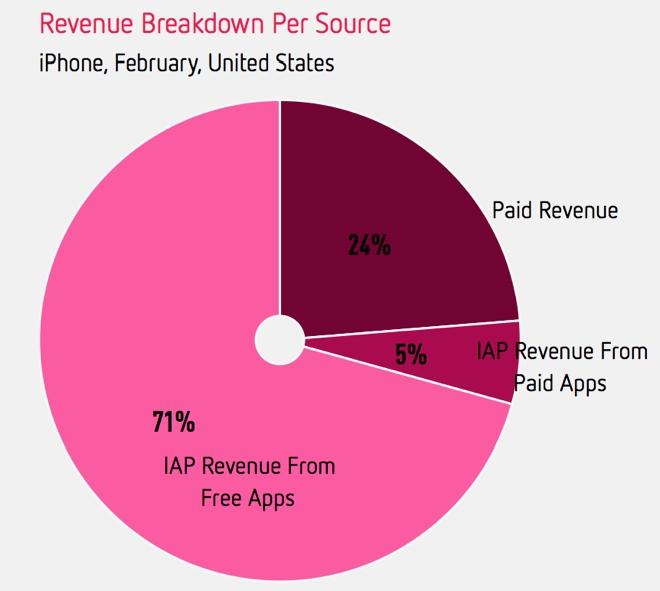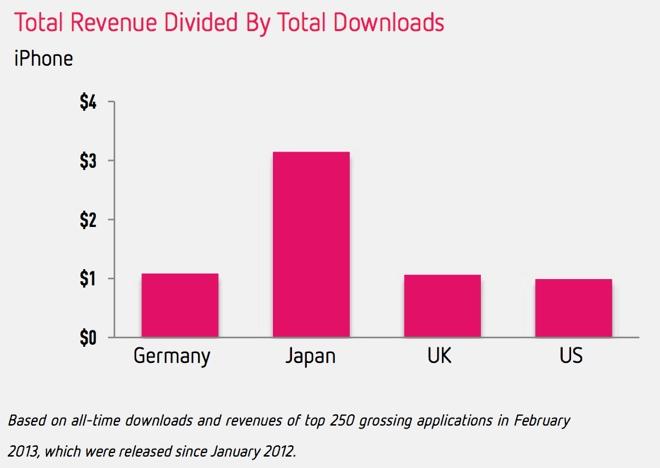A new study showcases the dominance of "freemium" titles on Apple's iOS platform, as in-app purchases made through free apps accounted for 71 percent of total iPhone app revenue in the month of February.
The statistics published this week by analysis firm Distimo show that paid applications were responsible for just 24 percent of total iPhone app revenue in February. The remaining 5 percent came from in-app purchases done through paid applications.
Unsurprisingly, the biggest earners among "freemium" iPhone apps are games, with Clash of Clans taking the top spot for February. The only non-game to crack the top 10 was TurboTax SnapTax, which took tenth place ahead of the coming U.S. tax deadline.
The average revenue per device among the top 10 apps ranges widely, from What's the Word earning 37 cents, to Rage of Bahamut taking in $7.04 per device.
Among the top 250 grossing iPhone apps, 170 are free with in-app purchases, while 53 are paid with in-app purchases. The remaining 27 applications are paid-only.
Broken down by country, users in Japan spend the most on in-app purchases, with an average of more than $3 per title downloaded. Distimo even excluded Puzzles & Dragons, the No. 1 grossing app in Japan, as it would have skewed the results and driven the average revenue per device in that country even higher.
In comparison, the U.S., U.K., and Germany all spend about $1 per download on average, meaning the average download in Japan is worth more than those three countries combined, excluding Japan's most popular title.
While "freemium" apps account for the most revenue, they also generate less revenue per download than a paid application, through which a developer collects money up front.
"Freemium" titles have been a source of controversy, as they are frequently downloaded by children who can rack up charges on their parents' App Store account. That prompted Apple to add a notice last week highlighting when a free application includes in-app purchases.
Apple was even sued in 2011 and was accused of collecting "millions of dollars" from unauthorized in-app purchases made by children. Apple settled the case earlier this year and offered $5 iTunes credits to the complainants.
 AppleInsider Staff
AppleInsider Staff








-m.jpg)






 Charles Martin
Charles Martin
 Christine McKee
Christine McKee
 Wesley Hilliard
Wesley Hilliard
 Malcolm Owen
Malcolm Owen
 Andrew Orr
Andrew Orr
 William Gallagher
William Gallagher
 Sponsored Content
Sponsored Content







17 Comments
although i'm often told i act like a child, i'm not. full grown adult here. i downloaded the popsci app just over a year ago and bought a 1-year subscription. when i did so i reminded myself that i needed to disable the auto-renew "feature" (and then went off and did something else.) about a month ago, remembering my subscription was about to expire, i reminded myself again to go disable auto-renew (because at this point i really did not to want to renew; love the print magazine, not so much the digital version.) i couldn't find where to do that right away and then got distracted by something else. fast-forward a month and there's a charge on my card for another year. yes, it's my responsibility and i'll eat the charge but you'd think that if apple can repeatedly send a message to how-many-hundreds-of-millions of ios users that there's an update available, they could also send a reminder to people on auto-renew saying they're going to charge your card or else, with a direct link to the app store app to disable auto-renew. of course, that would reduce revenue. (and yes, i've since disabled the damn thing ... although i also think you ought to be able to do that from the individual apps as well as the app store app ... the first place i looked to do that was the popsci app.)
Personally I hate freemiun titles. Just let me pay for the app & be done with it.
although i'm often told i act like a child, i'm not. full grown adult here.
i downloaded the popsci app just over a year ago and bought a 1-year subscription. when i did so i reminded myself that i needed to disable the auto-renew "feature" (and then went off and did something else.) about a month ago, remembering my subscription was about to expire, i reminded myself again to go disable auto-renew (because at this point i really did not to want to renew; love the print magazine, not so much the digital version.) i couldn't find where to do that right away and then got distracted by something else. fast-forward a month and there's a charge on my card for another year.
yes, it's my responsibility and i'll eat the charge but you'd think that if apple can repeatedly send a message to how-many-hundreds-of-millions of ios users that there's an update available, they could also send a reminder to people on auto-renew saying they're going to charge your card or else, with a direct link to the app store app to disable auto-renew. of course, that would reduce revenue.
(and yes, i've since disabled the damn thing ... although i also think you ought to be able to do that from the individual apps as well as the app store app ... the first place i looked to do that was the popsci app.)
Apple acutally does do this. I received two notices about my iTunes match renewing. The problem is that you weren't being billed by Apple, but the app. The charge of course gets routed through your iTunes account but Apple wouldn't have known that you had auto renew on your account with another company.
Personally I hate freemiun titles. Just let me pay for the app & be done with it.
I don't mind freemium titles if you can actually play or use the app for free. I play Clash of Clans and have never spent a penny on it. I enjoy messing around with it and it is a decent time waster. The same for Real Racing 3. The apps that require you to buy things to continue playing irritate me however.
i downloaded the popsci app just over a year ago and bought a 1-year subscription. when i did so i reminded myself that i needed to disable the auto-renew "feature" (and then went off and did something else.) about a month ago, remembering my subscription was about to expire, i reminded myself again to go disable auto-renew (because at this point i really did not to want to renew; love the print magazine, not so much the digital version.) i couldn't find where to do that right away and then got distracted by something else. fast-forward a month and there's a charge on my card for another year.
This is where the Apple Reminder app, which is in every iPhone and iPad, comes in handy.